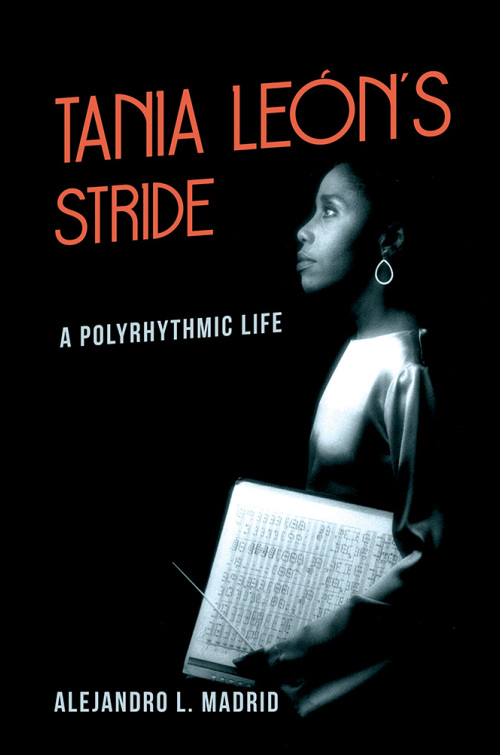When considering that the canon of western art music is based in a sy stem of white supremacy and patriarchy, it is a sad truth that most of the music that is presented in classrooms and concert halls is written by dead, white, men. Scholars continue to spend great amounts of time in archives, studying scores, and speculating over the motivation, inspiration, and reasoning behind the compositional choices of dead individuals, whose works are performed too often, even ad nauseam. This speculating – which consumes vast resources – is often for our own navel gazing and can lead to only more informed speculation instead of insights based on accuracy. That is why it is so important – but also deeply refreshing and invigorating – to be able to read the conversations of scholar Alejandro L. Madrid with acclaimed composer Tania León in Madrid’s recent biography of León: Tania León’s Stride: A Polyrhythmic Life, published by University of Illinois Press.
stem of white supremacy and patriarchy, it is a sad truth that most of the music that is presented in classrooms and concert halls is written by dead, white, men. Scholars continue to spend great amounts of time in archives, studying scores, and speculating over the motivation, inspiration, and reasoning behind the compositional choices of dead individuals, whose works are performed too often, even ad nauseam. This speculating – which consumes vast resources – is often for our own navel gazing and can lead to only more informed speculation instead of insights based on accuracy. That is why it is so important – but also deeply refreshing and invigorating – to be able to read the conversations of scholar Alejandro L. Madrid with acclaimed composer Tania León in Madrid’s recent biography of León: Tania León’s Stride: A Polyrhythmic Life, published by University of Illinois Press.
The text places León in context of time and place, centering her life, work, artistic choices, background, family dynamics, and personal outlooks in a way which adds even greater depth and meaning to her beautifully vibrant music. Beginning with León’s childhood in Cuba, where she was raised in a matriarchal family, and following her path from a concert pianist to a Pulitzer Prize winning composer and acclaimed conductor, readers are able to hear from León, herself, in conversation with Madrid, as well as from her friends, family, former students, and peers. Surrounding these conversations are Madrid’s thoughtful contextualization of the works, as well as analysis and deeper conversation about compositional choices.
While many classical music enthusiasts are likely to recognize Tania León’s name as that of a contemporary composer, it is only through understanding the settings of her experiences that listeners can begin to fully appreciate the full scope of León’s work and achievements. In reading through the timeline of her life and the opportunities that she embraced, as well as the challenges she faced because of the systems of white supremacy and patriarchy, one can better understand the artistic choices that she has made throughout her career.
As a feminist scholar and musicologist, I am deeply appreciative in having heard in León’s own voice the reasons why she rejects the confines of being labeled in constricting terms. Madrid’s thoughtful introduction, in which he carefully sets expectations, explains his approach, and provides a guide to the coming chapters, also presents reader’s with León’s stance, recognizing that León acquiesced to the terminology “woman of color” or “person of color”, but outrightly rejects being identified as a “woman composer/conductor” or a “Black composer/conductor”. León has also worked throughout her career to dismantle hierarchichal expectations of race and gender, actively striving to lift the voices of the underrepresented particularly in classical music communities. The experiences outlined in this biography of the racism and patriarchy that she has encountered even relatively recently in her career only emphasize the amount of work that still needs to be done to even come close to achieving equity in these spaces. However, León’s stance is that creating limits to who and what a person can be through specific terms only works against this idea of fluidity and belonging in a community.
Madrid’s careful organization of the text, which places León’s life and career not in a linear timeline, but rather in context of overarching themes, provides a distinctly self aware – and not comprehensive – biography. As León is still composing, advocating, and showing her influence over the classical music world, a comprehensive biography or catalog of her works is currently impossible. Instead, he offers in depth conversation, context, and analysis of several key pieces from León’s career so far to guide the reader into her polyrhythmic mindset, and how she synthesizes her experiences having been born in Cuba, working in the United States, and frequently traveling throughout the world
From her early days as a rehearsal pianist for Dance Theatre of Harlem, to being thrown into composition, long before she identified herself as a composer, and then also pushed upon the podium with a baton long before she considered herself to be a conductor, Tania León appears to always embrace the opportunities presented to her.
Tania León’s Stride is a thoughtful and inclusive biography of the composer and conductor, and provides a unique context to her life and work. Madrid’s text is a rich addition to the scholarship of contemporary music as it continues to lift León’s voice to more conversations, deeper study, and the increased performances that these works deserve.
As a relevant listening example, here is the London Sinfonietta performing León’s Indígena, which is discussed throughout the book and provides a wonderful introduction to León’s compositional style, polyrhythms, and ways in which she incorporates the sounds of the world around her – past and present – into her music.

